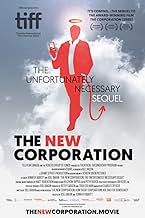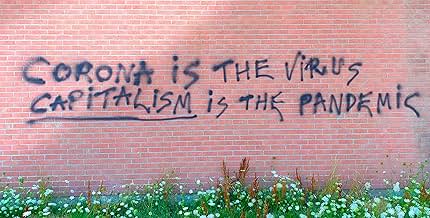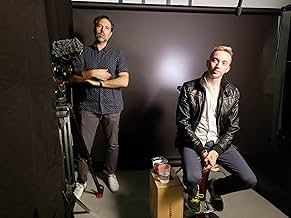The New Corporation: The Unfortunately Necessary Sequel
- 2020
- 1 घं 45 मि
IMDb रेटिंग
7.0/10
732
आपकी रेटिंग
अपनी भाषा में प्लॉट जोड़ेंExposes how companies are desperately rebranding as socially responsible - and how that threatens democratic freedoms.Exposes how companies are desperately rebranding as socially responsible - and how that threatens democratic freedoms.Exposes how companies are desperately rebranding as socially responsible - and how that threatens democratic freedoms.
- पुरस्कार
- 1 जीत और कुल 8 नामांकन
फ़ीचर्ड समीक्षाएं
I really liked the original The Corporation, so I was excited about this follow up. However, as many have mentioned this sequel is less of a documentary and more of a socialist propaganda; even if you agree with everything that is said and presented here (and as a left leaning person myself, I totally do), it offers very little in terms of an actual unbiased look at corporations like the first film did. In the end worth the watch if you are on the left side of the political spectrum, but know that it might end up just being another piece of your echo chamber.
This is a well-produced documentary that starts off quite informatively by calling out how corporations use various methods to reinforce the narrative that they are socially responsible and helping the planet while simultaneously putting profits before anything. Great point made about how banks (JP Morgan is called out specifically) responsible for the 2008 crisis fancied themselves as "saviours" in the fallout by investing in a place like Detroit, where they stand to make a bundle either way. It also makes good points about corporate tax evasion and influence of their money in politics.
It really only tells one side of the story in most cases it studies however, which is a strongly socialist perspective. I'm not saying that's wrong as I myself support certain socialist ideas, but it's worth noting the politics of those being interviewed is overwhelmingly left-wing. As a result, it's more of a one-sided conversation, which is quite disappointing and a bit preachy to the viewer. As with any contemporary media these days, it also had to throw in a jab at Trump supporters because apparently they all support corporate greed and blame their struggles on minorities.
My biggest qualm is that in the last half or so it jumps from topic to topic, mostly socialist talking points, that are essentially unrelated to corporations aside from the Australian coal company. It's like I was watching a completely different documentary and it felt more like disorganized propaganda at that point.
First half, 7.5/10. Second half, 3/10. I really wish they would have gone into more depth on a couple of topics as opposed to just briefly giving left-leaning viewpoints on a cherry-picked assortment of social, economic, and political topics. It was reasonably interesting overall though, so it gets a 6.
It really only tells one side of the story in most cases it studies however, which is a strongly socialist perspective. I'm not saying that's wrong as I myself support certain socialist ideas, but it's worth noting the politics of those being interviewed is overwhelmingly left-wing. As a result, it's more of a one-sided conversation, which is quite disappointing and a bit preachy to the viewer. As with any contemporary media these days, it also had to throw in a jab at Trump supporters because apparently they all support corporate greed and blame their struggles on minorities.
My biggest qualm is that in the last half or so it jumps from topic to topic, mostly socialist talking points, that are essentially unrelated to corporations aside from the Australian coal company. It's like I was watching a completely different documentary and it felt more like disorganized propaganda at that point.
First half, 7.5/10. Second half, 3/10. I really wish they would have gone into more depth on a couple of topics as opposed to just briefly giving left-leaning viewpoints on a cherry-picked assortment of social, economic, and political topics. It was reasonably interesting overall though, so it gets a 6.
A sequel to a 2003 documentary I first saw back in high school, the 17 years between that film and its sequel has certainly given The New Corporation a great deal of material to cover in its 106-minute runtime. It argues that corporations have become sneakier and more fake-friendly since the 2010s, seeing as tides have changed a little, and the blatant disregard for human lives isn't something they're able to get away with as easily (the 2003 original spent almost 2.5 hours diagnosing the corporation as a psychopath, or at least saying the concept of a corporation would be a psychopath if it were a person).
With a great deal of topics and issues to tackle, The New Corporation is worryingly scattershot at first. It doesn't always feel like it has much of a reason for existing in its opening scenes, and feels underwhelming and a little tired as a result. It does considerably pick up steam at a point, and thankfully became very interesting after its shaky start. It takes some complicated, difficult ideas and explains them very well; certainly in a more competent and understandable way than some YouTube videos I've seen on issues surrounding capitalism and corporate influence on politics.
I feel like it reverts to the messiness of the opening scenes in its closing scenes, unfortunately. It covers some 2020 events that are important issues, but doesn't always do the best job at linking them to issues surrounding corporations (there should be documentaries about the George Floyd protests, but maybe not this documentary - there are some loose connections to the main issues of The New Corporation, but it's not as relevant as some of the other things discussed).
It does also let a few politicians off the hook, but the fact it often comes back to "the system doesn't work; we need a new system" makes the criticisms of conservatives feel less pro-centre-left and more just against the system that lets conservative parties do damage. Others may feel differently, though; that's to be expected when politics enter into a documentary, but I don't think they could've avoided getting political altogether here.
With a great deal of topics and issues to tackle, The New Corporation is worryingly scattershot at first. It doesn't always feel like it has much of a reason for existing in its opening scenes, and feels underwhelming and a little tired as a result. It does considerably pick up steam at a point, and thankfully became very interesting after its shaky start. It takes some complicated, difficult ideas and explains them very well; certainly in a more competent and understandable way than some YouTube videos I've seen on issues surrounding capitalism and corporate influence on politics.
I feel like it reverts to the messiness of the opening scenes in its closing scenes, unfortunately. It covers some 2020 events that are important issues, but doesn't always do the best job at linking them to issues surrounding corporations (there should be documentaries about the George Floyd protests, but maybe not this documentary - there are some loose connections to the main issues of The New Corporation, but it's not as relevant as some of the other things discussed).
It does also let a few politicians off the hook, but the fact it often comes back to "the system doesn't work; we need a new system" makes the criticisms of conservatives feel less pro-centre-left and more just against the system that lets conservative parties do damage. Others may feel differently, though; that's to be expected when politics enter into a documentary, but I don't think they could've avoided getting political altogether here.
After watching the corporation (2003) before this sequel, I'm not sure how these two documentaries can be comparable to each other. One describes in depth what corporations are and how they have impacted the world, while this new film doesn't speak of corporations almost at all.
We all know from the first film what corporations have done, and other documentaries have informed us of the culmination of what happens in a society that is now corporate controlled. I'm talking about the financial crisis movies that have shown what corps can do with their power. As well as the social dilemma, and Edward Snowden docs which highlight what corporations are doing which is mining our information. Finally climate docs which highlight how unchecked stripping of resources destroys ecosystems.
This documentary however is basically an overview of what we know and what has been released previously, while also giving an overview of recent historical uprisings/protests.
Overall I really don't think this doc was as informative and crucial as the first. We all know by now that corps control the world, and that the gap between the haves and the have nots is widening. This doesn't give much insight as to the change that is suggested throughout. Intense capitalism and intense socialism are the current state of affairs, and will be until there is a state which doesn't value competition between anyone, at all.
Only a certain amount of $ and collectivism can do that. So all out socialism can only work through a manifestation of current capitalism to suit the collective. Those with the most power are the only ones that can do this, so siding against the corps (which seems to be the message here) isn't going to do any good, imho.
Ricky Meffe review. Twitter: Rickymeffe
We all know from the first film what corporations have done, and other documentaries have informed us of the culmination of what happens in a society that is now corporate controlled. I'm talking about the financial crisis movies that have shown what corps can do with their power. As well as the social dilemma, and Edward Snowden docs which highlight what corporations are doing which is mining our information. Finally climate docs which highlight how unchecked stripping of resources destroys ecosystems.
This documentary however is basically an overview of what we know and what has been released previously, while also giving an overview of recent historical uprisings/protests.
Overall I really don't think this doc was as informative and crucial as the first. We all know by now that corps control the world, and that the gap between the haves and the have nots is widening. This doesn't give much insight as to the change that is suggested throughout. Intense capitalism and intense socialism are the current state of affairs, and will be until there is a state which doesn't value competition between anyone, at all.
Only a certain amount of $ and collectivism can do that. So all out socialism can only work through a manifestation of current capitalism to suit the collective. Those with the most power are the only ones that can do this, so siding against the corps (which seems to be the message here) isn't going to do any good, imho.
Ricky Meffe review. Twitter: Rickymeffe
I don't normally write feedback on fake reviews but these are so obvious its not funny. To name democrats and in particular to call "Kshama Sawant a socialist, but an evil one at that"...... is ridiculous. A right wing opinion that brings politics into a review of a movie/documentary is not right.
Now I will watch this and review it properly.
Now I will watch this and review it properly.
क्या आपको पता है
- ट्रिवियाThis program documentary was funded by the biggest media corporation in Canada
- कनेक्शनFollows The Corporation (2003)
टॉप पसंद
रेटिंग देने के लिए साइन-इन करें और वैयक्तिकृत सुझावों के लिए वॉचलिस्ट करें
- How long is The New Corporation: The Unfortunately Necessary Sequel?Alexa द्वारा संचालित
विवरण
- रिलीज़ की तारीख़
- कंट्री ऑफ़ ओरिजिन
- आधिकारिक साइटें
- भाषा
- इस रूप में भी जाना जाता है
- Новая корпорация: К несчастью необходимый сиквел
- फ़िल्माने की जगहें
- उत्पादन कंपनियां
- IMDbPro पर और कंपनी क्रेडिट देखें
- चलने की अवधि1 घंटा 45 मिनट
- पक्ष अनुपात
- 16:9 HD
इस पेज में योगदान दें
किसी बदलाव का सुझाव दें या अनुपलब्ध कॉन्टेंट जोड़ें



















